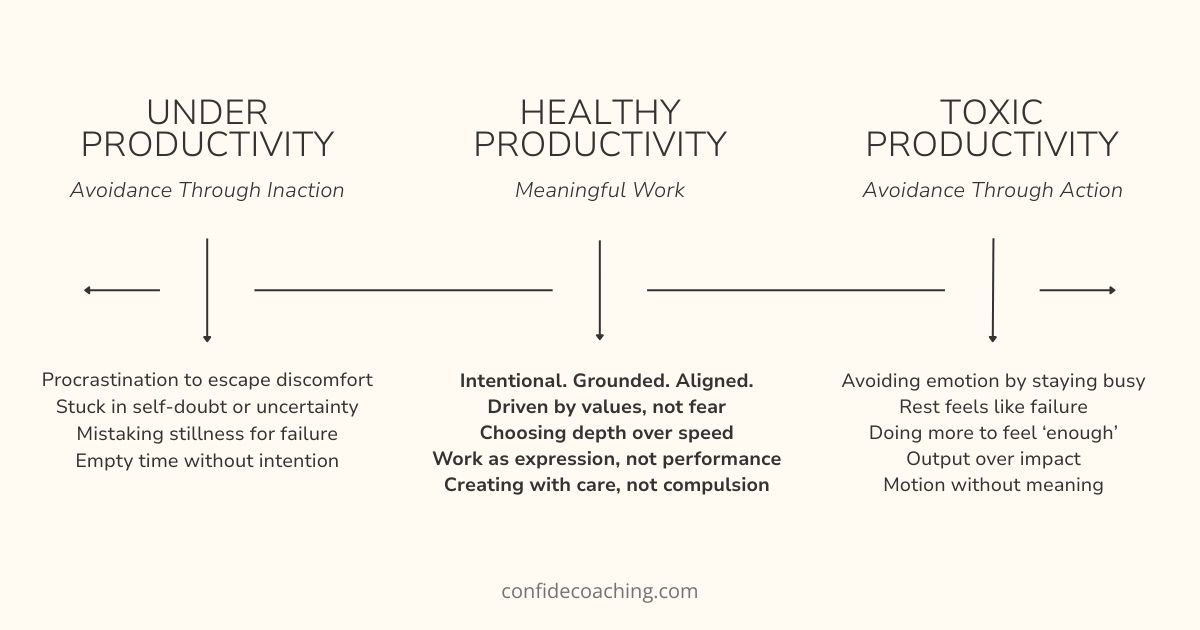
When Productivity Becomes a Distraction
What if all that productivity isn’t ambition — but avoidance?
We live in a world where being busy is a badge of honor. The full calendar, the cleared inbox, the back-to-back tasks — they all signal competence, drive, maybe even success. And yet, beneath the surface, many high performers feel a growing sense of emptiness. You’re checking off boxes, racing through deadlines, optimizing every workflow — but instead of feeling fulfilled, you feel hollow. Like you’re moving fast… but going nowhere.
This is the quiet cost of toxic productivity.
It looks like success from the outside. But on the inside, it often masks something else entirely — discomfort, self-doubt, uncertainty. Toxic productivity isn’t just about doing too much. It’s about using doing to avoid feeling. It becomes a socially acceptable form of escapism — one that’s rewarded, praised, even admired — all while quietly pulling you further away from meaning.
What are you trying not to feel when you open another tab to check your inbox?
What’s left when the to-do list is empty — and are you afraid to face it?
This article is an invitation to pause and ask a different question: What if productivity isn’t about getting more done, but about doing the right things well — with care, clarity, and purpose?
It’s time to choose: Toxic Productivity or Meaningful Work.
What Is Toxic Productivity — And Why It’s So Seductive
Toxic productivity isn’t just about working hard — it’s about working compulsively, often without questioning why. It’s the relentless drive to always be doing something. To squeeze more out of every minute. To chase the next goal, then the one after that. Not because the work is meaningful, but because not working feels like failure.
It hides behind good intentions: “I just want to stay on top of things.”
But underneath, there’s often something deeper:
- A fear of falling behind
- A belief that rest is laziness
- A quiet panic that without constant output, your value will disappear
In that way, toxic productivity becomes more than just a habit — it becomes a belief system.
One that tells you:
- If you’re not busy, you’re wasting time.
- If you’re not producing, you’re not enough.
- If you slow down, someone else will get ahead.
And this belief system is reinforced everywhere: hustle culture, social media comparison, apps that gamify productivity, and corporate environments that celebrate output over impact.
But here’s the catch: the more you feed it, the more it demands. Toxic productivity doesn’t lead to peace or progress — it leads to burnout, disconnection, and shallow work. It seduces you with the promise of accomplishment, but rarely delivers the satisfaction you’re actually craving.
Because what you’re really craving isn’t just progress — it’s purpose.

The Hidden Emotional Cost — Toxic Productivity as Escapism
At its core, toxic productivity isn’t about ambition. It’s about avoidance.
When you’re constantly pushing yourself to do more, faster, better — it might look like drive. But more often, it’s a distraction. A socially accepted way to avoid the discomfort that comes with slowing down: uncertainty, self-doubt, anxiety, even the question of meaning itself.
Because when you stop producing, you’re left with something much harder — your own thoughts.
And many high achievers would rather stay in motion than sit with those.
It’s easier to open another tab than to ask, Why am I doing this in the first place?
It’s easier to check one more thing off the list than to face the quiet fear that you’re unsure where it’s all leading.
This is how productivity becomes a shield.
It keeps you moving fast enough to avoid looking too closely.
And while the outside world rewards this — praising your work ethic, your output, your efficiency — the inside story tells a different truth:
- The joy fades.
- The creative spark dims.
- You can’t remember the last time you felt proud of what you actually made.
That’s the emotional cost of toxic productivity: not just burnout, but a kind of inner erosion.
A subtle disconnection from your own purpose, your own values, your own voice.
And the real tragedy? The work may keep flowing — but it stops feeling alive.
The Reframe — From Throughput to Craftsmanship
If toxic productivity is about throughput — churning out more, faster, and checking off tasks to feel in control — then meaningful work is about craftsmanship.
It’s not about speed. It’s about care.
A productivity-obsessed world treats us like machines on an assembly line: optimize, automate, accelerate. But meaningful work asks you to step off that line and consider another model — the craftsman.
The craftsman doesn’t rush.
She doesn’t measure success by how much she can squeeze into one day.
She chooses what to work on with intention.
She iterates. She reflects. She steps back to see the whole.
Because her goal isn’t just to finish — it’s to create something that matters.
When you approach work like a craft:
- You optimize for impact, not just output.
- You make room for reflection, not just reaction.
- You prioritize depth over busyness.
- You stop chasing praise and start asking: Is this meaningful to me?
And here’s the truth: this kind of work often looks slower from the outside — but it builds momentum that lasts. It feeds your creativity, your confidence, and your sense of alignment.
It’s not about doing less for the sake of less.
It’s about doing fewer things, better — so your time and energy serve something you actually care about.
This is the shift from toxic productivity to meaningful work.
From a life of motion to a life of intention.
The Deeper Layer — Productivity and Self-Worth
At the heart of toxic productivity lies a quiet but powerful belief:
“If I’m not producing, I’m not valuable.”
It doesn’t always show up loudly. Sometimes it hides behind phrases like:
- “I just don’t want to waste time.”
- “I need to stay ahead.”
- “I feel better when I’m busy.”
But underneath is often a deeper fear — that worth is conditional. That rest is weakness. That identity is only secure when it’s backed by performance.
This is where productivity stops being a system and starts becoming a story about who you are.
When your sense of self is fused with how much you do, it becomes nearly impossible to slow down without guilt. Even leisure feels like failure.
And in a world that constantly tells you to hustle, to grind, to never stop — it’s easy to internalize the idea that being still is being less than.
But the truth is this: your worth isn’t something you earn by crossing tasks off a list.
- You are not your output.
- You are not your inbox.
- You are not your KPIs, your calendar, or your ability to stay ahead of the next thing.
- You are allowed to matter even when you pause.
And when you stop producing from a place of fear, you create space for something better — work that comes from alignment, not anxiety. Work that feels like you, not just your role or reputation.
This is the deeper shift: from defining yourself by how much you get done… to redefining productivity as an expression of who you are — not the condition for it.
How to Shift Toward Meaningful Work
Escaping toxic productivity isn’t about rejecting discipline or abandoning ambition — it’s about redefining what success feels like and choosing a slower, deeper, more intentional way of working.
Here’s how to start making that shift:
1. Ask Better Questions
Before jumping into your to-do list, pause and ask:
- “What would make today’s work meaningful?”
- “What do I want to feel proud of at the end of this day — not just finished with?”
Let your answers guide your priorities, not just your schedule.
2. Choose Depth Over Volume
Resist the pull to do it all. Pick one high-quality task each day that truly matters — something that moves the needle, strengthens your craft, or aligns with your deeper goals.
Let go of busywork that only creates the illusion of progress.
3. Build in White Space
You don’t need to earn rest — you need it to do your best work.
Create space in your day for reflection, recovery, or simply doing nothing.
This isn’t laziness. It’s where clarity, creativity, and strategy actually live.
4. Redefine Success
Start measuring your productivity by new metrics:
- Did I create something I’m proud of?
- Did I stay aligned with what I value?
- Did I bring care and focus to what I was doing?
Replace urgency with intention. Replace hustle with craft.
5. Work From Identity, Not Insecurity
Let your work express who you are — not prove that you’re enough.
When you work from a grounded sense of self, you’re free to focus on quality, impact, and legacy — not just output.
This isn’t about doing less to settle. It’s about doing less so you can do what truly matters — with more depth, energy, and integrity.
It’s Time to Choose
We all want to feel like we’re making the most of our time — that what we do matters. But somewhere along the way, we started equating productivity with worth, output with success, and speed with significance.
That’s the trap of toxic productivity: it keeps you in motion but pulls you away from meaning.
You don’t need another hack to get more done in less time.
You need a different relationship with time — one rooted in clarity, care, and craft.
So the choice is yours:
Do you keep chasing output for the sake of staying busy?
Or do you choose to create work that feels aligned, intentional, and deeply satisfying?
Productivity will always be part of your life.
But it doesn’t have to be a performance.
It can be an expression of what you value.
It can be slower.
It can be better.
It can be yours.
Toxic productivity or meaningful work — it’s time to choose.

Paul Strobl, MBA, CPC
Owner of Confide Coaching, LLC
Paul is a Master Life Coach for GenX and GenY executives and business owners. Originally from Houston, Texas, he has been location independent for most of his adult life. He currently resides in the Rhodope Mountains of Bulgaria near the Greek border with his brilliant wife, 14-year-old stepson (officially adopted in 2021!) and a Posavac Hound rescue.

